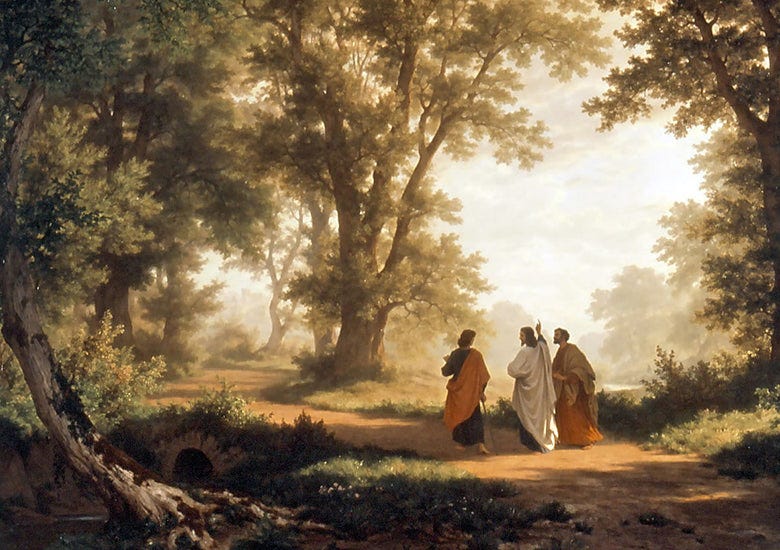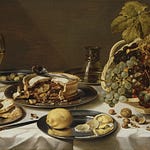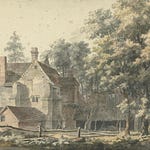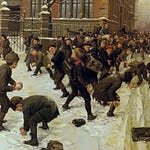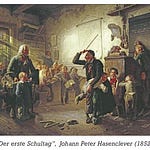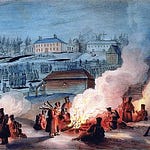How does the human memory make blends of things, endlessly creative, far beyond any simple recording device! I was sure when I chose our Word of the Week, road, that I would find it in the gospel of Luke, when the two disciples were on the road to Emmaus, and Jesus appeared beside them, and had to explain the Scriptures to them point by point; and I see in my mind’s eye a wonderful painting of the scene, which I remember from my boyhood, because I saw it every time I was at my Aunt Marie’s house.
Yet the word road doesn’t appear in that episode in Luke. In fact, in the King James Bible, the word appears only once. It’s when David has fled from Saul, and is under the temporary protection of Achish, the king of Gath. From Gath, David and his six hundred men launch regular attacks on the Amalekites and others in the neighboring lands, so that Achish said to him, “Whither have ye made a road today?” Achish did not mean, “What street have you paved?” He did not even mean, “Where did you go today?” He meant, specifically, “Where did you ride forth to make a raid today?” For road and raid in this case are doublets. A road is a riding, and if we’re talking about land, it suggests getting on your horses to make a raid.
Then I said to myself, “But I’ve seen the word road in Shakespeare!” Yes, I have: but only a couple of times to mean the path you take to get from one place to another. That notion was rare, and a sort of figure of speech, to apply the word for riding to the thing you are riding over. Generally, where we might use the word road, Shakespeare and his contemporaries used way, or highway. Shakespeare sometimes uses road to mean a raid; more often a riding; and most often — what we find hard to figure — the harbor where your ships are riding. “Sweet lady, you have given me life and living,” says the merchant Antonio to Portia, when he reads the good news in a letter from his agent far away, “For here I read that certain of my ships / Are safely come to road.” So if you’ve heard of Hampton Roads, the very large bay at the mouth of the James River in Virginia, you’ll not be surprised to learn that it was sailors in Shakespeare’s time who gave it that name.
But in our time, the word road is everywhere, and in plenty of interesting phrases, too. If you say, “Hit the road, Jack!” you mean, “Get lost, pal!” Baseball teams really did once play road games, because they got where they were supposed to go by bus or by rail: they were on the road. A roadhouse, in America before the days of motels, was an inn on the road, that is, outside of town, where you could get a meal and maybe a bed for the night, but often the country people roundabout would go there for dances and maybe, well, some strong drink. Then there’s that Road Runner of happy memory, Chuck Jones’ bright little bird that tears up the desert roads of Arizona, while the scraggly ever-famished Coyote dreams up one absurdly ingenious scheme after another to try to catch him, often with devices he orders from the Acme Company, such as an outboard-motor steamroller — what can possibly go wrong? Actually, a roadrunner is a member of the cuckoo family, and they do run fast, but not as fast as coyotes do. Roadrunners are useful birds, because they eat a lot of critters people don’t like to have around: they are the rattlesnake’s only predator. But Chuck Jones’ Road Runner never leaves the road. “Otherwise he wouldn’t be a road runner,” said Jones.
There’s a romance to the road, isn’t there? I like to study road maps, even though I’m pretty sure I’ll never actually travel, say, from Yellowknife to Labrador City. Man on earth is the essential pilgrim: he is, paradoxically, best at home when he knows that earth is not his home, but a beloved station along the way. It’s when he puts all his trust in this home that he begins to chafe, to feel a certain disappointment. The novelist Thomas Wolfe lost his faith, and so it’s no surprise that he should also have lost hold of love for his home. “You can’t go home again,” he wrote, not confessing that going home was the last thing he wanted to do. Meanwhile, Cormac McCarthy’s novel The Road, though I wouldn’t recommend it to children, is a heartfelt study in the love of father and son, and even though it’s an apocalyptic world they live in, somehow a faith in eternal truth shines through.
The word road itself is well attested in Old English rad, not meaning way or street, but, as I said, a raid or a riding; but we also get it in the wonderful kenning hwael-rad, in Beowulf, meaning the whale-road, that is, the ocean where the whales go riding. It comes from the verb ridan, to ride: think of the vowel change as we go from the verb sing to the noun song, or from the verb strike to the noun stroke. Ride is what we call a Class 1 strong verb: “strong” means that it forms its past tense by a vowel change and not the dental suffix we usually spell as -ed. Those in Class 1 have the typical vowel changes you get in rise, rose, risen; bid, bade, bidden; drive, drove, driven; smite, smote, smitten. A lot of the verbs in that old class now have forms in the past tense that have moved over to the vowel in the present, such as bite, bit, bitten (it ought to be “bote”); others have lost the past participle in -en, such as slide, slid, slid (it ought to be slide, slode, slidden; when Dizzy Dean, announcing baseball games for NBC, made all the English teachers tear their hair out as he said slud for slid, ol’ Diz was closer to the old form).
Dear Readers, if we haven’t met you on this road of life already, and even if we have, may we all meet together where the good road is going, in that place that is always new, which the disciples long ago were seeking, though they did not know it, when Jesus met them, and at last they knew him in that wayside inn, that roadhouse, in the breaking of the bread.



